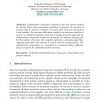1658 search results - page 277 / 332 » Learning Mixtures of Gaussians |
SODA
2008
ACM
13 years 9 months ago
2008
ACM
The problem of maximizing a concave function f(x) in a simplex S can be solved approximately by a simple greedy algorithm. For given k, the algorithm can find a point x(k) on a k-...
ICA
2010
Springer
13 years 9 months ago
2010
Springer
Independent Component Analysis is the best known method for solving blind source separation problems. In general, the number of sources must be known in advance. In many cases, pre...
IJON
2008
13 years 8 months ago
2008
Discovering a representation that allows auditory data to be parsimoniously represented is useful for many machine learning and signal processing tasks. Such a representation can ...
JMLR
2006
13 years 8 months ago
2006
We apply a type of generative modelling to the problem of blind source separation in which prior knowledge about the latent source signals, such as time-varying auto-correlation a...
CVPR
2009
IEEE
15 years 3 months ago
2009
IEEE
A Bayesian marked point process (MPP) model is developed
to detect and count people in crowded scenes. The
model couples a spatial stochastic process governing number
and placem...

